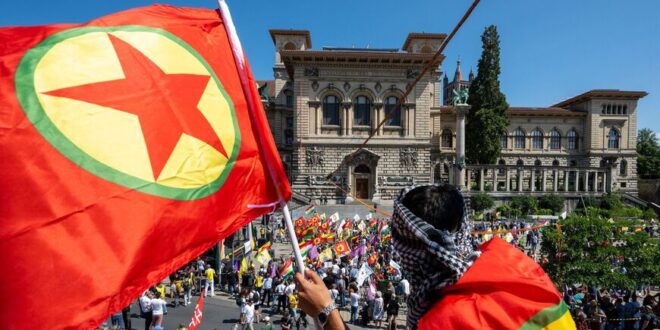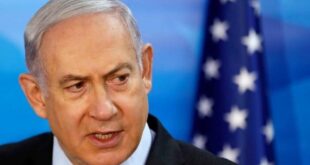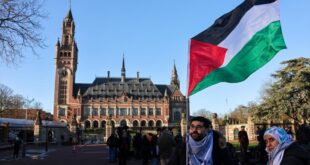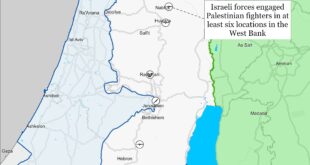The attack inside Turkey, the first since 2016 for the PKK, has prompted worries over Washington’s partnership with Syrian Kurds.
The outlawed Kurdistan Workers Party (PKK) carried out a suicide attack on the headquarters of Turkey’s national security directorate in Ankara on Sunday. Does the violence mark a shift in the group’s strategy that can imperil the military partnership between its Syrian Kurdish franchise and the United States?
The issue gained fresh urgency as Turkey’s President Recep Tayyip Erdogan renewed pledges hours after the strike to establish a security belt “beyond our southern borders” that would be “at least 30 kilometers deep.”
Turkey insists that the Syrian Democratic Forces (SDF), the United States’ top ally in the fight against the Islamic State (IS), poses a national security threat because its lead component known as the People’s Defense Units (YPG) is closely linked to the PKK. Armed with such justification, Turkey has launched multiple ground offensives against the SDF, which occupies large chunks of northeastern Syria that were under Kurdish control and notionally under US or Russian protection, and keeps threatening to do so again.
On Sunday, Turkey carried out a fresh wave of airstrikes on the PKK’s headquarters in the Qandil Mountains separating Iran from Iraq, and separate drone strikes on suspected PKK operatives in Qamishli in northeast Syria.
The Ministry of Defense said the strikes in Syria “neutralized” Muzdelif Taskin, a PKK militant accused of planning an ambush that killed 12 Turkish soldiers in 2007.
Sunday’s strikes in Iraq destroyed 20 targets, “consisting of caves, bunkers, shelters and depots used by the separatist terrorist organization,” and also “neutralized” Kurdish militants, the ministry said.
The ministry added that it would pursue operations in northern Iraq until “there is not a single terrorist left.”
First attack in Ankara since 2016
Until recently, the PKK refrained from carrying out high-profile attacks inside Turkey. It lacks the operational ability, given the ever-tightening grip of Turkey’s intelligence services, but also does not want to provide Ankara with ammunition in its argument that the United States should sever its ties with the SDF. At the same time, the PKK has been campaigning to get off the United States’ list of designated foreign terrorist organizations.
If an estimated 900 US Special Operation Forces were to pull out of Syria, the Kurdish-led entity known as the Autonomous Administration of North and East Syria would likely collapse. The Biden administration has ruled out a withdrawal, saying the US-led coalition will continue to partner with the SDF against IS. However, behind closed doors, US officials increasingly question the merits of sustaining that alliance, especially at the cost of alienating Turkey, a NATO ally, whose value has shot up since the conflict in Ukraine.
The United States swiftly condemned Sunday’s attack in which one of the assailants blew himself up while the other was shot dead by police. Public fury grew upon news that the perpetrators had killed a veterinarian in the province of Kayseri in order to seize his car, which they drove to Ankara. The PKK claimed responsibility for the suicide attack in a statement saying that it was timed to coincide with the opening of the parliament and was carried out by a team “linked to the Immortals Battalion” group, one of several such armed formations used for urban operations.
The PKK suggested that it could have inflicted far greater damage but refrained from doing so and chose to send “the requisite message” and deliver “a serious warning” instead.
The PKK has not carried out any attacks inside the Turkish capital since 2016, when Turkish forces launched its first ground incursion against the group in northern Syria.
However, a Sept. 26 suicide attack by two female fighters on a Turkish police building in the southern province of Mersin might have served as warning for what was to come. Roj Girasun, a Kurdish researcher based in Diyarbakir, noted that it would not be surprising if the PKK were to continue to stage further such attacks. “The PKK is sending a loud and clear message that ‘we are still here,’” Girasun told Al-Monitor.
Turkey has squarely gained the upper hand in its 39-year-long fight against the PKK thanks to its domestically produced drones that have shot to global renown. Hundreds of PKK cadres have been killed in drone strikes in Iraq and Syria as Ankara seeks to eliminate the group’s new crop of potential leaders. The PKK’s founding leader, Abdullah Ocalan, has been in jail since 1999. Its top commanders, holed up in the remote mountains of Iraqi Kurdistan, are in their late 60s and early 70s and their left-wing revolutionary diatribes sound increasingly out of touch with younger generations of urbanized Kurds.
No prospects for peace
Hopes of a peaceful solution to the Kurdish question evaporated when Erdogan pulled the plug on direct talks between the government and Ocalan in 2015. A mutually observed 2½-year cease-fire collapsed, leading to the current spiral of escalation targeting the Kurdish political movement within Turkey as well. Selahattin Demirtas, the highly popular former chair of the largest pro-Kurdish party, the People’s Democratic Party (HDP), remains behind bars along with thousands of party officials and sympathizers convicted of thinly evidenced terror charges of membership in the PKK. They include democratically elected mayors who were stripped of their seats and replaced by government administrators in critical places such as the Kurds’ informal capital, Diyarbakir.
The party, which ran as the Green Left Party in the May parliamentary and presidential elections in a bid to avert being shut down, saw its popularity drop by three percentage points.
Debate has since been raging within Kurdish circles on whether to pursue Demirtas’ strategy of appealing to non-Kurdish voters, one that saw the party enter the parliament for the first time in 2015, or to revert to its narrowly Kurdish agenda, which fires up the base.
That debate has been taking place as the PKK ponders its own future with some cadres questioning the merits of keeping the United States happy by refraining from violence inside Turkey while Washington’s priority is to fix its relationship with Turkey. Washington continues to spurn diplomatic engagement of a kind that would legitimize the Syrian Kurdish body while keeping largely mum when Turkey targets the SDF, including its top commander Mazlum Kobane.
Erdogan’s victory at the polls shattered hopes for a resumption of the peace talks that would at a minimum give the militants some breathing space.
Some in the PKK argue that unless it burnishes its military credentials, it will be perceived as increasingly weak and irrelevant. Besides, with the elections out of the way, it can no longer be accused of undermining the HDP and with Erdogan firmly opposed to the renewal of the peace process, there is more to gain than to lose. Historically, whenever the PKK inflicted high casualties on the Turkish military, the Turkish state reached out to the rebels in order to de-escalate.
But as Ilhami Isik, a Kurdish commentator who advised the government during the latest round of peace talks, noted, thanks to Turkey’s increasingly sophisticated technology and spy network, conventional guerrilla tactics no longer have the same effect, leaving the PKK with few options other than urban attacks. These do not sit well with the bulk of Kurdish voters; the more civilians die, the more support for the rebels fades. And should Turkey be able to prove that any of the assailants crossed from Syria regardless of their affiliation, the harder it will become for Washington to maintain its public stance that the PKK and the YPG are different.
 Eurasia Press & News
Eurasia Press & News




